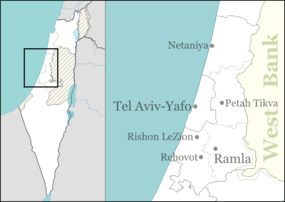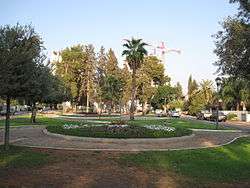Yehud
Yehud
| |
|---|---|
| Hebrew transcription(s) | |
| • ISO 259 | Yhud |
 | |
 Yehud Location within Israel's Central District | |
| Coordinates: 32°2′0″N 34°53′0″E / 32.03333°N 34.88333°ECoordinates: 32°2′0″N 34°53′0″E / 32.03333°N 34.88333°E | |
| District | Central |
| Founded | 1953 |
| Government | |
| • Type | City |
| • Mayor | Yaela Machlis (Yehud-Monosson) |
| Area | |
| • Total | 4,100 dunams (4.1 km2 or 1.6 sq mi) |
| Population (2007) | |
| • Total | 25,604 |
| Name meaning | Named for Biblical location |
Yehud (Hebrew: יְהוּד) is a city in the Central District in Israel that is part of the joint municipality of Yehud-Monosson. In 2007, Yehud's population is approximately 30,000 (including Neve Monosson – see below).[1]
History
Yehud is mentioned in the Bible in a list of towns in the area ("and Yehud and Bnei Brak and Gat Rimon" - Book of Joshua 19, 45). The Aramaic term Yehud refers to a province under the Persian empire, Yehud Medinata, in the area of what was roughly the Kingdom of Judah which issued Yehud Coinage, small silver coins inscribed with the three letters "Yhd". The actual size of Yehud during this time remains debated by scholars (e.g., did it occupy the entirety of the previous kingdom, or was it much smaller). Yehud's constituency also remains debated (e.g., was it composed only of those Judeans who returned from Babylon, or did these intermix with "the people (already) in the land" – עם הארץ).
In later centuries Yehud became the Arab town of Al-Yehudiya (in literal Arabic: "place of the Jews"), also called Al-'Abbasiyya, but the Arab population left in its entirety during the 1948 Arab-Israeli War.
The town was repopulated in the early 1950s by Ladino-speaking Jews of Turkish extraction and subsequently also by Jews from Białystok, Poland and other parts of the Diaspora. The town greatly expanded in later years, developed an industrial and hi-tech area with companies such as IAI and Mercury Interactive and attracted thousands of academics and professionals in new, highly invested neighborhoods such as Givat Avia and Kiryat HaSavyonim.
In June 2011, the city's officials announced they would undertake a massive construction project to replicate the old town square of the Swiss city of Lugano in the center of their city, to reinvigorate commerce and tourism. The replica will be replete with neoclassical columns and colonnades. This project is scheduled to be finished and in fall 2016.[2]
Local government

In 2003, the Yehud-Monosson Municipality was formed to provide municipal services to Yehud and the neighboring community of Neve Monosson (pop. 2,600). Under the terms of the merger, Neve Monosson remains with a high level of autonomy under the Neve Monosson Local Administration (minhelet). The Neve Monosson Local Administration was granted municipal status as an autonomous borough (vaad rova ironi) by the Interior Minister in 2005 within the implementation of the merger plan. In a practical sense, the Yehud-Monosson Municipality really functions as the municipality of Yehud whilst providing basic statutory municipal services to Neve Monosson on an outsourcing basis.
Demographics
According to CBS, in 2001 the ethnic makeup of the city was all Jewish. See Population groups in Israel. According to CBS, in 2001 there were 10,500 males and 11,100 females. The population of the city was spread out with 33.4% 19 years of age or younger, 16.1% between 20 and 29, 19.9% between 30 and 44, 18.8% from 45 to 59, 2.9% from 60 to 64, and 8.8% 65 years of age or older. The population growth rate in 2001 was 2.6%.
Economy
Yehud serves as the base of the large Africa Israel Investments company majority owned by Lev Leviev.
Education
According to CBS, there are 10 schools and 5,159 students in the city. They are spread out as 6 elementary schools and 2,252 elementary school students, and 5 high schools and 2,907 high school students. 54.2% of 12th grade students were entitled to a matriculation certificate in 2001.
Sports
Football: (Soccer) Hapoel Yehud spent several seasons in the top division of Israeli football during the late 1970s and early 1980s, and won the State Cup in 1982. However, after several relegation's the club folded in 1998. A new club, Hapoel Ironi Yehud, was established in 2004 and currently plays in Liga Gimel. (Division III)
Notable residents
- Golan Pollack, Olympic judoka
References
- ↑ "היסטוריה". Yehud-Monoson municipality. Retrieved 14 November 2015.
- ↑ Sleepy Israeli Town to Reconstruct Replica of Italian Neighborhood, Haaretz